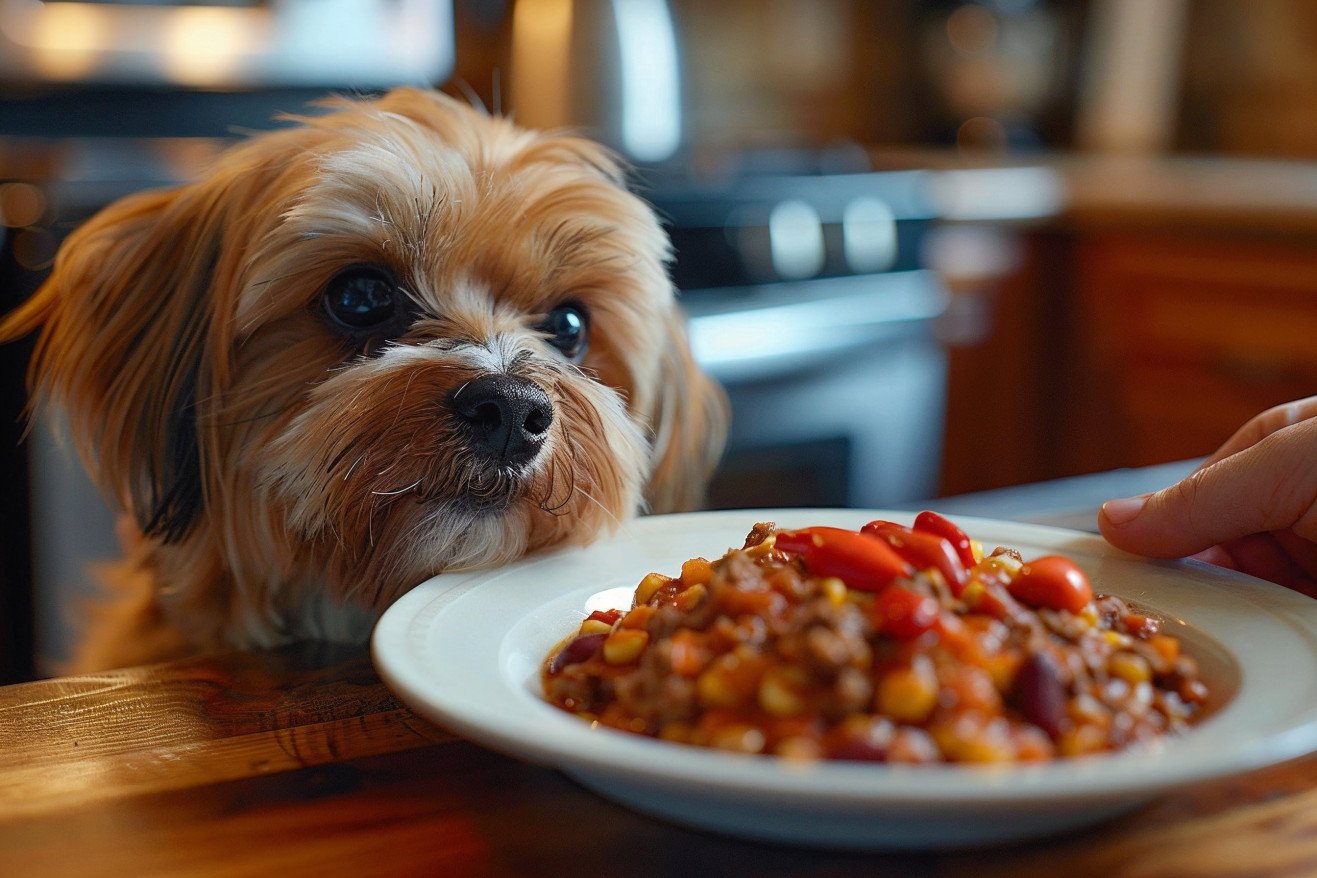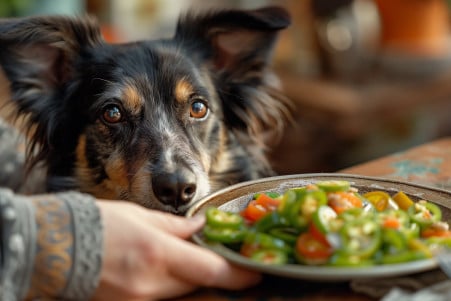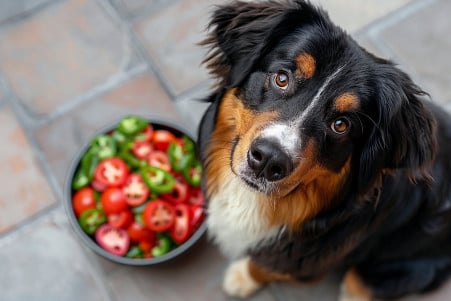Can Dogs Have Chili? It's Complicated
1 April 2024 • Updated 1 April 2024

If you’ve ever been tempted to share a spoonful of chili with your dog, you might be wondering if it’s safe to give them a taste. The short answer is no, dogs cannot have chili or other spicy foods. In addition to the potential for gastrointestinal upset, chili and other spicy foods can cause irritation to a dog’s mouth, throat, and stomach due to the spices they contain, including chili peppers and capsaicin. This article explains why you should avoid giving chili and other spicy human foods to your dog.
Although the idea of spicy food may not sound particularly appealing to you, especially if you’ve ever eaten something too spicy, you may be surprised to learn that some studies have suggested dogs may perceive spicy flavors differently than humans.
To better understand this, we’ll explore the topic from a variety of angles, including the perspectives of veterinary nutritionists, animal behavior scientists, and the results of research on canine taste and digestion. This comprehensive overview will help dog owners better understand the potential risks and benefits of letting their dogs sample human foods.
Can dogs eat chili?
Toxic Spices and Seasonings: Ingredients to Avoid in a Dog's Diet
There are several spices and seasonings that are commonly found in human food that are toxic or harmful to dogs. According to Rover.com, garlic, onions, salt, cocoa powder, and nutmeg are just a few of the spices that should never be given to dogs due to their potential toxicity.
Onions and garlic contain disulfides that can cause damage to red blood cells and result in anemia. Salt can lead to dehydration, vomiting, and other problems if ingested in large amounts. Cocoa powder contains caffeine-like substances that are extremely toxic to a dog's nervous system and can lead to kidney and heart issues. Nutmeg can lead to severe gastrointestinal upset, restlessness, and in some cases death, according to the same source.
Meanwhile, cayenne, chili peppers, and allspice all contain capsaicin, which can cause irritation in a dog's mouth, throat, and digestive tract, leading to vomiting, diarrhea, and gastrointestinal upset. Even small amounts of these toxic spices can be harmful. According to The Dog Bakery, capsaicin is hard for dogs to digest and is very inflammatory.
It's important for dog owners to know which spices and seasonings are safe for dogs and which ones should be avoided entirely. In addition to capsaicin, allspice also contains eugenol, which can cause severe vomiting, loss of motor function, and even death in high doses. Keeping dogs away from these toxic spices and seasonings is important to avoid discomfort, health problems like pancreatitis, and even life-threatening issues.
Potential Symptoms and First Aid for Accidental Spicy Food Ingestion
If a dog eats chili or other spicy foods, it may experience symptoms such as vomiting, diarrhea, and stomach upset. According to Hepper, the capsaicin in chili peppers can cause a burning sensation that can lead to distress in dogs, which may cause them to sneeze, drool, or foam at the mouth. The intensity of these symptoms can vary based on the amount of spicy food the dog has eaten and the dog's sensitivity to the food.
If your dog eats spicy food, it's important to call a vet right away for professional help. As Hill's Pet notes, a vet may advise you to induce vomiting, give the dog fluids to help with hydration, or take other steps based on the situation. Getting help from a vet as soon as possible can help ensure that your dog gets the care they need to prevent any serious health issues and help them feel better.
If the dog has eaten spicy food that contains onion or garlic, which are poisonous to dogs, the vet may induce vomiting to prevent the toxins from being absorbed into the dog's system, according to Hepper. The vet may also give the dog charcoal to help prevent absorption and may monitor the dog, including running tests, and giving the dog IV fluids.
Dog-Safe Spices and Healthy Human Food Alternatives for Dogs
While many spices and seasonings are off-limits, there are some less potent options that can be used in moderation to spice up a dog's diet. As noted by Dogster, herbs and spices like basil, cinnamon, ginger, and turmeric can help dogs in a variety of ways, including providing anti-inflammatory and antioxidant benefits.
Instead of feeding dogs spicy human food, dog parents can choose from a variety of healthy human food alternatives, including frozen fruits, unseasoned cooked meats, or dog treats. Sara's Happy Paws suggests treats like raw honey, roasted brussels sprouts, raspberries, and pumpkin seeds as healthy options for dogs.
Whenever a new food or spice is introduced to a dog's diet, it should be done so slowly and with close attention to the dog's reaction. As noted by Dogsee Chew, it's important to talk to a vet to make sure any new additions to a dog's diet are safe and tailored to their specific needs.
Potential Long-Term Risks of Feeding Dogs Spicy Foods
While a one-time incident of a dog eating something spicy may not result in any lasting damage, regularly feeding dogs spicy or spicy-flavored foods can result in long-term health problems. According to PepperScale, long-term exposure to capsaicin and other spicy food irritants can cause chronic gastrointestinal upset, inflammation, and even damage to the digestive tract. In the most serious cases, The Dodo explains that regularly feeding dogs spicy foods can even make them more susceptible to conditions like pancreatitis, which can be fatal for dogs.
It's also important to note that dogs can't develop a tolerance to spicy foods over time because their bodies aren't designed to process the ingredients in these foods, as pointed out by The Spruce Pets. As a result, it's important to avoid regularly feeding dogs spicy or spicy-flavored human foods in order to protect their health and well-being, according to TryFi.
Conclusion: How to Keep Your Dog Healthy and Happy
Although dogs may perceive spicy flavors differently than humans, it's best to avoid feeding them chili or other spicy foods due to the potential health risks. Some spices and seasonings, including garlic, onions, and chili peppers, are toxic to dogs and should never be included in their diet.
If a dog does consume spicy food, it's important to seek veterinary care immediately to reduce the risk of discomfort and health problems. Instead of feeding dogs spicy human foods, pet parents can opt for safe and healthy treat options, such as unseasoned meats, fruits, and vegetables. By being aware of a dog's dietary requirements and steering clear of potentially dangerous ingredients, pet parents can ensure their dogs are healthy, happy, and satisfied.


